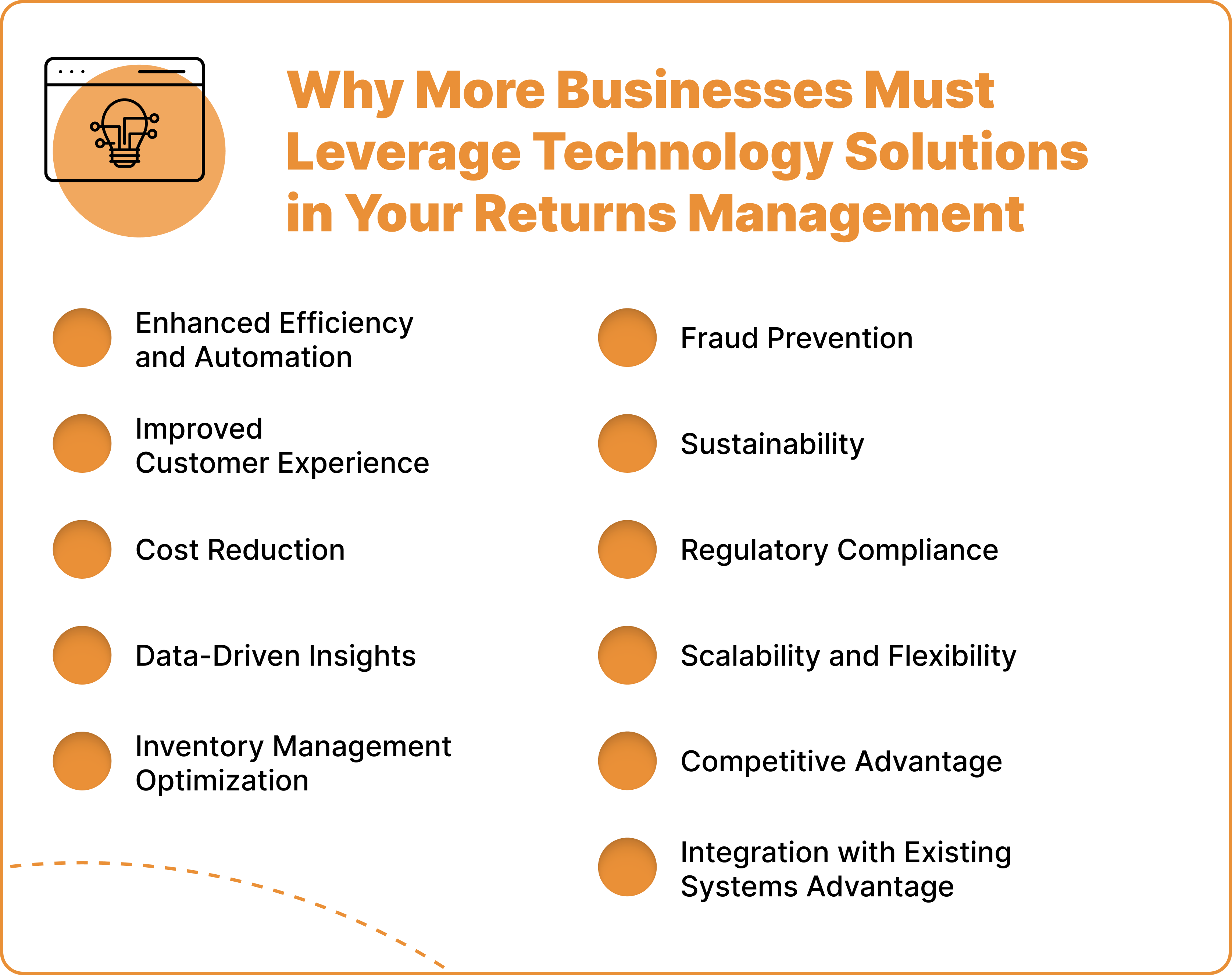11 Reasons to Leverage Technology Solutions in Your Returns Management

The returns management process can be complicated, especially because of its nature, which can be confusing to sort through. For larger businesses, the process can be much more challenging, particularly with the increasing volume of online purchases. Managing returns from e-commerce transactions presents unique challenges, including logistics and costs. In a modern supply chain landscape where time and resources are highly valued, it is impossible to continue running the returns process manually and expect it to achieve much success. That is where technology solutions become vital.
Technology has always been a cornerstone of supply chain operations, shaping the course of history. From the development of the wheel, which facilitated smoother and more efficient land transportation, to the advent of ships that transformed global trade by enabling the movement of goods across oceans, technology has played a crucial role. In the context of returns management, technology can empower businesses to effectively collect items from customers, sort through them to determine eligibility and usability, and then integrate them back into the supply chain or dispose of them.
Why More Businesses Must Leverage Technology Solutions in Your Returns Management

Technology solutions continue to become a priority as the reverse logistics and returns management process, especially for online purchases, plays a more significant role for retail businesses (online or in-store). Here is why they matter:
1. Enhanced Efficiency and Automation
Manual tasks, especially repetitive ones, can suck time and resources for many businesses. Handling returns from online purchases presents specific challenges, such as managing logistics and costs, which can be efficiently addressed through automation. They are also prone to errors, which can impact the output of the returns management process. For instance, during the sorting process, a team member might put a product that should be earmarked for disposal into the pile that gets integrated into the supply chain. That almost certainly means another customer will buy, and the process will be repeated.
The impact on the customer and resources might be minimal, but it starts to add up if done enough times. This is one major reason more businesses are clamoring for technology solutions in their returns management process. It allows for the automation of manual tasks, which can, in turn, speed up the entire process, freeing up staff to focus on more strategic priorities. Some return management tasks that can be automated are shipping return label generation, tracking returned items, sorting, and refund processing.
2. Improved Customer Experience
Customers always look for a great experience whenever they engage with a brand or business. For online retailers, part of that experience is offering a streamlined customer return or reverse logistics process. A streamlined return process for online purchases enhances the customer experience by making it easier and more efficient. Although businesses can automate several tasks on their end, customers are still left exposed to manual tasks such as requesting returns and constantly calling to find out the status of the return process.
But what if all that wasn’t necessary? With a technology solution like the ReverseLogix returns management platform, businesses can provide customers with online portals, self-service options, and real-time tracking updates, giving them greater control and transparency over the entire process. This allows more businesses to ensure customer satisfaction and repeat purchases because customers are more comfortable with the company.
3. Cost Reduction
Through automation, businesses can reduce mistakes across returns management. The financial impact of managing returns from online purchases can be significant, but automation can help reduce these costs. But what about the financial impact of these mistakes? Technological solutions like Automated Returns Processing can integrate with the entire returns ecosystem across all 3PL, ERP, or eCommerce tools to increase automation value and reach.
These businesses can also optimize transportation resources through effective scheduling and identify more cost-effective product recovery opportunities, lowering overall operational costs.
4. Data-Driven Insights
With technology solutions, businesses can now harness the power of advanced analytics, empowering them with valuable insights into crucial questions such as the reasons behind customer returns and strategies to enhance the customer experience. Analyzing data related to returns from online purchases is crucial as it helps improve the returns management process by identifying patterns and challenges specific to e-commerce transactions.
With these insights, more businesses can gain access to valuable information that can help them reduce returns, optimize the customer’s experience, identify relevant trends, and improve product quality. Businesses can also use the information provided to make informed decisions about return rates.
5. Inventory Management Optimization
The returns management process can impact the flow of inventory. The increasing volume of returns from online purchases adds complexity to inventory management, necessitating efficient technology solutions to handle these returns effectively. Any reliable inventory management system must be able to keep track of inventory on hand and those either going out of or coming into the supply chain. With the returns management process, this becomes increasingly more complicated, especially because these are supplies already marked by the system as delivered.
However, robust technology solutions like the ReverseLogix returns management system make these calculations easy, providing a robust and accurate real-time analysis of the entire inventory. The tech solution also guarantees that the returned items are promptly inspected, restocked, or disposed of as needed, thereby minimizing losses and maximizing recovery value.
6. Fraud Prevention
One of the many issues with allowing returns is the propensity for fraudulent returns, which can slip through the system and cost the supply chain. Returns from online purchases present specific challenges in preventing fraud, but technology solutions can help mitigate these risks. With technology solutions, more businesses can leverage advanced analytics, pattern recognition, and various verification tools to identify and mitigate these fraudulent returns.
7. Sustainability
Technology plays a crucial role in promoting sustainability in businesses and supply chains. Managing returns from online purchases has a significant environmental impact, and technology solutions can promote sustainability by optimizing return routes and facilitating product refurbishment or recycling. Technology solutions can significantly reduce the environmental impact of operations by managing the entire returns process, from optimizing return routes to facilitating product refurbishment or recycling. Additionally, these solutions can enhance the sorting process, further reducing waste. Because of how vital sustainability is for customers, improving the process could lead to customer loyalty.
8. Regulatory Compliance
Technology solutions make staying compliant with complex and evolving regulations a breeze. In the context of online purchases, regulatory compliance is crucial for managing returns efficiently, and technology solutions can help ensure adherence to these regulations. These solutions automate compliance checks and ensure adherence to legal requirements, relieving businesses of the burden of navigating the regulatory landscape on their own.
9. Scalability and Flexibility
Fluctuating returns volume, especially during peak seasons or sales windows, can overwhelm the business and its return management team. The need for scalable solutions to handle fluctuating return volumes from online purchases is crucial, as technology solutions can provide the necessary flexibility. However, the process becomes much more manageable with the right technology solutions. This enhances the system’s ability to handle such volumes and grow the business seamlessly.
10. Competitive Advantage
In an increasingly tight and competitive world, more businesses can stand out by offering customers the return option. However, in a world where almost every business has that option, the next level will be to optimize the returns process so much so that customers have no choice but to become loyal. Optimizing the returns process for online purchases is crucial to gaining a competitive edge, as it addresses the challenges of managing logistics and costs associated with e-commerce sales.
Leveraging returns management software makes this possible. Businesses can offer superior customer service, reduce costs, and gain a competitive edge.
11. Integration with Existing Systems
Technology has advanced greatly in logistics and supply chains, including returns management operations and reverse logistics processes. Integrating returns management systems with e-commerce platforms is crucial to handling returns from online purchases efficiently. Today, modern returns management platforms can seamlessly integrate with existing systems and tools in the supply chain, creating a unified system landscape for greater efficiency and visibility.
Leverage ReverseLogix For an All-in-One Returns Management Platform
ReverseLogix is a comprehensive returns management system (RMS) that enables companies to streamline return requests, logistics, inventory and processing, connecting every point in the return lifecycle, all through an intuitive and flexible SaaS platform. It effectively handles returns from online purchases, addressing the challenges of e-commerce logistics and costs. Connect every customer, channel and technology across your ecosystem to empower, enable and equip your business to optimize processes, maximize ROI, gain valuable insight and deliver a world-class customer experience with each return. Schedule a Demo.
Frequently Asked Questions
Manual returns management is slow, error-prone, and can lead to unhappy customers. Technology streamlines operations, cuts costs, and enhances the overall customer experience.
An RMS automates tasks, improves the customer experience through transparency and self-service, reduces costs, provides valuable data insights, customer retention opportunities, optimizes inventory, prevents fraud, and helps with regulatory compliance.
Technology solutions can handle complexities like customs clearance and international shipping, making managing cross-border returns easier.
Technology solutions can handle complexities like customs clearance and international shipping, making managing cross-border returns easier.
Managing returns from online purchases presents challenges such as logistics, costs, and customer satisfaction. Efficient handling of e-commerce returns requires robust processes and partnerships. Implementing a returns management system can streamline operations, reduce costs, and improve customer satisfaction by providing easy return options and transparency.
